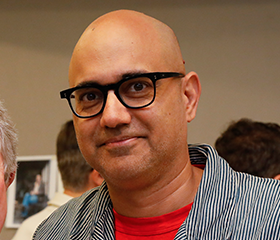McNEAL is Ayad Akhtar’s fourth play to be produced by Lincoln Center Theater. It centers around an esteemed American novelist called Jacob McNeal. The drama is not Akhtar’s first about a writer – that would be The Who & the What, produced at LCT3 in 2014. Nor is McNEAL Akhtar’s first production in the Vivian Beaumont Theater – that was Junk, in 2017. But McNEAL is Akhtar’s first drama involving Artificial Intelligence, so it seemed fitting that we begin with that topic the other day while speaking in the Beaumont lobby.
“I’ve been playing with the various language models since they went live a year-and-a-half ago,” Akhtar said. “People ask me: ‘Did you use GPT or anything like that for McNEAL? If they’d been good enough while I was writing early drafts of the play I’m guessing I would have tried. But it was pretty clear they weren’t going to be helpful in that regard, so I didn’t.” Akhtar went on: “But exploring the models helped me understand what’s happening. The technology is moving so quickly. We’re getting very close to generating meaningfully interesting text artistically.”
If Akhtar is firm that McNEAL was not generated by use of an artificial language model he is equally clear that such technology does not cause him undue worry. “The way artificial intelligence generates language is not meaningfully different from how humans generate language. It’s all about context, which is what the models are mathematizing. Needless to say, we, sentient humans, have created the model.” He added: “That’s important to realize because the fundamental conflicts in McNEAL are not about writing per se but about being human.”
Akhtar let slip that McNEAL is “more autobiographical” than might otherwise seem to be the case, though, when pressed, he was reluctant to say more.
It’s not my place here to connect all the author-to-work dots. But I am going to mention one similarity between Akhtar and Jacob McNeal: they are both enamored with Shakespeare. Because the play does not begin performances until September 5th I will not fill in the contours of McNeal’s obsession. Akhtar revealed one of his own. “In my early forays with the various large language models, one of the first things I noticed was how much it reminded me of linguistic processes I find in Shakespeare. For me, he is the ultimate lens on how language operates on our consciousness and how language shapes our cognition – which is basically a form of what AI is doing.”
For Akhtar, Shakespeare brings up another point relevant to current technological discussions: the degree to which any writer uses, borrows, even steals from other sources. “Theft,” said Akhtar, “is the great metaphor in the play. And not just in this McNeal’s particular story but regarding what the creative process is. Because you’re never free from influence when you create. Harold Bloom once said that the true subject of poems is not life but other poems. I think that’s very true. We create using the work of others who have moved us.”
The majority of McNEAL’s characters, seen and unseen, are women. “The play,” said Akhtar, “is about the title character’s relationship to the feminine in his life, but it’s also about a certain kind of cultural comeuppance for a white male writer. Philip Roth is one example of this type but there are certainly others.”
I asked Akhtar how McNeal might fit the type. “He has a very robust vision of what a writer can be for the world. Some would think that is arrogant but there was a time when we looked to writers to try to make sense of our politics and our society. We don’t do that anymore – that model of a writer is dead.”
The theater, thankfully, is not, however often glib people try to say so. “One thing that theater still has going for it,” Akhtar said, “is real presence. In an increasingly virtual world, I think that that presence, and the sharing of a story with a large group of people, will retain a resonance.”
Brendan Lemon is a freelance journalist in New York.
